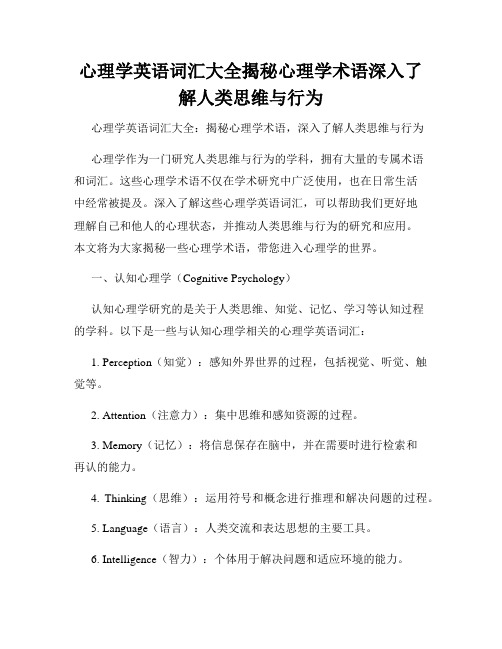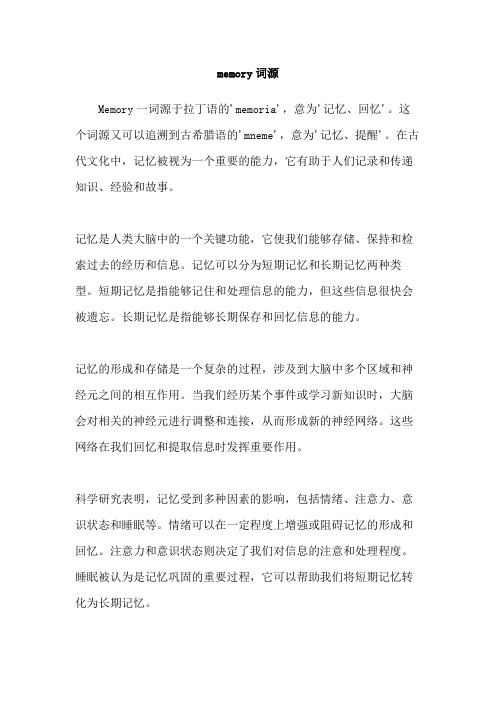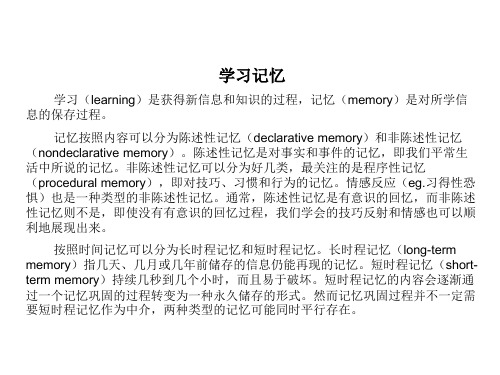语言学习记忆Memory
记忆力与语言学习掌握外语的记忆技巧

记忆力与语言学习掌握外语的记忆技巧记忆力与语言学习:掌握外语的记忆技巧外语学习是很多人的追求之一,无论是为了工作需求还是个人兴趣,掌握一门外语都是非常有益的。
然而,外语学习并不是一件容易的事情,特别是对于记忆力较弱的人来说。
本文将探讨记忆力与语言学习之间的关系,并提供一些有效的记忆技巧,帮助读者更好地掌握外语。
一、记忆力与语言学习的关系记忆力在语言学习中起着举足轻重的作用。
毫无疑问,词汇是语言学习的基石。
一个人若无法记住足够多的词汇,就难以理解和表达外语。
因此,提高记忆力是掌握外语的关键。
记忆力与大脑的联结是通过神经元之间的连接来实现的。
人的大脑中有数十亿的神经元,它们通过神经元之间的连接信息传递。
而记忆力可以通过不断加强神经元之间的连接来提高。
因此,训练记忆力就是在加强脑神经元之间的连接,使其更为牢固。
二、提高记忆力的技巧1. 活用多种感官人类的记忆过程与感官紧密相关,通过多种感官参与学习可以提高记忆效果。
在语言学习中,我们可以通过听、说、读、写多种方式来加深印象。
比如,可以通过听力练习来训练听觉记忆,通过口语练习来训练口语记忆,通过阅读练习来训练视觉记忆,通过写作练习来训练书写记忆。
综合运用多种感官可以全方位地提高记忆。
2. 创造联想联想记忆是一种常用的记忆技巧。
通过将外语单词与已有的知识、经验进行联想,可以更容易地记住它们。
比如,我们可以将一个生词与与其发音或形状相似的物体进行联系,或者将其与已经熟悉的词汇进行对比,以帮助记忆。
创造有趣的联想可以使记忆更加深入和持久。
3. 制定学习计划学习计划对于记忆力的提高至关重要。
制定明确的学习目标和计划,合理安排学习时间,将语言学习分解为有序的小目标,可以有效提高记忆效果。
此外,定期复习也是非常重要的,通过间隔性的复习可以巩固记忆并避免遗忘。
4. 利用记忆辅助工具在学习外语时,可以利用一些记忆辅助工具来帮助记忆,比如使用词卡、录音笔,或者下载一些记忆软件。
心理学英语词汇大全揭秘心理学术语深入了解人类思维与行为

心理学英语词汇大全揭秘心理学术语深入了解人类思维与行为心理学英语词汇大全:揭秘心理学术语,深入了解人类思维与行为心理学作为一门研究人类思维与行为的学科,拥有大量的专属术语和词汇。
这些心理学术语不仅在学术研究中广泛使用,也在日常生活中经常被提及。
深入了解这些心理学英语词汇,可以帮助我们更好地理解自己和他人的心理状态,并推动人类思维与行为的研究和应用。
本文将为大家揭秘一些心理学术语,带您进入心理学的世界。
一、认知心理学(Cognitive Psychology)认知心理学研究的是关于人类思维、知觉、记忆、学习等认知过程的学科。
以下是一些与认知心理学相关的心理学英语词汇:1. Perception(知觉):感知外界世界的过程,包括视觉、听觉、触觉等。
2. Attention(注意力):集中思维和感知资源的过程。
3. Memory(记忆):将信息保存在脑中,并在需要时进行检索和再认的能力。
4. Thinking(思维):运用符号和概念进行推理和解决问题的过程。
5. Language(语言):人类交流和表达思想的主要工具。
6. Intelligence(智力):个体用于解决问题和适应环境的能力。
二、社会心理学(Social Psychology)社会心理学研究的是人类在社会环境中的思维、感知、行为等。
下面是一些与社会心理学相关的心理学英语词汇:1. Social interaction(社会互动):人与人之间的交流和相互作用。
2. Attitude(态度):个体对特定对象或问题的评价。
3. Stereotype(刻板印象):对特定群体的固定而简化的看法。
4. Prejudice(偏见):基于刻板印象而产生的对他人的不公平或负面评价。
5. Group dynamics(群体动力学):研究群体中个体相互影响的过程。
6. Conformity(从众):个体基于群体压力而改变自己的行为或观点。
三、发展心理学(Developmental Psychology)发展心理学研究的是人类在不同年龄阶段的身心变化和发展规律。
memory词源

memory词源Memory一词源于拉丁语的'memoria',意为'记忆、回忆'。
这个词源又可以追溯到古希腊语的'mneme',意为'记忆、提醒'。
在古代文化中,记忆被视为一个重要的能力,它有助于人们记录和传递知识、经验和故事。
记忆是人类大脑中的一个关键功能,它使我们能够存储、保持和检索过去的经历和信息。
记忆可以分为短期记忆和长期记忆两种类型。
短期记忆是指能够记住和处理信息的能力,但这些信息很快会被遗忘。
长期记忆是指能够长期保存和回忆信息的能力。
记忆的形成和存储是一个复杂的过程,涉及到大脑中多个区域和神经元之间的相互作用。
当我们经历某个事件或学习新知识时,大脑会对相关的神经元进行调整和连接,从而形成新的神经网络。
这些网络在我们回忆和提取信息时发挥重要作用。
科学研究表明,记忆受到多种因素的影响,包括情绪、注意力、意识状态和睡眠等。
情绪可以在一定程度上增强或阻碍记忆的形成和回忆。
注意力和意识状态则决定了我们对信息的注意和处理程度。
睡眠被认为是记忆巩固的重要过程,它可以帮助我们将短期记忆转化为长期记忆。
在日常生活中,人们使用各种方法来改善记忆能力。
例如,通过反复学习和复习可以帮助记忆的巩固。
使用记忆技巧,如联想、编码和组织信息,也可以提高记忆效果。
此外,保持身体健康、保持良好的睡眠习惯和控制压力等,也对记忆力有积极的影响。
总而言之,记忆是人类大脑中重要的功能之一,它不仅帮助我们存储和回忆过去的经历和信息,还对学习、决策和问题解决等认知活动起到关键的作用。
对记忆的研究不仅有助于我们更好地了解人类思维和认知过程,还为改善记忆能力提供了科学依据。
记忆memory可数范文

记忆memory可数范文memory既可以作为可数名词也可以作为不可数名词。
1、memory表示泛指的、抽象的记忆(力)时,通常是不可数的,复数形式是memories。
【例句】Theboyhasagood(bad)memory.这孩子记忆力好(不好)。
2、memory表示某一段时间经历过的具体的记忆片段时,通常是可数的。
【例句】Memoriesofhappierdayswereenshrinedinmyheart.以前快乐日子的记忆铭刻在我的心中。
3、表示“对……的记忆”,一般用介词for。
如:Johnhasagoodmemoryfornames(faces,figures).约翰对人的名字(面孔、数字)有很好的记忆力。
扩展资料:(1)Thescenewillremainforeverengravedonmymemory.那情景将永远铭刻在我的记忆中。
(2)Sohowdoyougoaboutimprovingyourmemory?那么,你如何开始改善记忆力呢?(3)Lifeisallaboutthememories.Gocreatethem.回忆是生活的全部,大胆的去创造它们。
(4)Ihavethememoriesofmeandthatbeautifulgirltogetherlastsummer.对于那个夏天,我和那个女孩子发生的故事,我仍记忆犹新。
(5)Thisisthetoughestpartbecausewetendtoburysomeofthesestressfu lmemories.这可能是最艰难的一步,因为我们倾向于埋葬掉这些沉重的记忆。
尽管这件事过去五年了,但在我脑海中却打下深深的烙印,给我留下了深刻的印象。
四年级时,学校组织我们到盘山旅游。
中午,同学们都在天成寺休息。
吃饱喝足后,我在周围溜达起来,满山的果树已经成熟,多美啊!我正陶醉在大自然的美景之中,只见一个年龄和我相仿的小姑娘担着两大筐东西停下来。
baidu-学习记忆

Y-Maze即为三等分辐射式迷宫,由三个支臂和一个连接区组成,三个臂相互夹角 120°。我们把小鼠放在连接区,软件自动记录分析5min内小鼠连续选择的次数和正确率。 该实验连续做三天,每天实验前把小鼠拿进实验房间适应一小时。Y-Maze实验设计也有 Spontaneous和rewarded两种,可根据实际需求设计实验。
memory 雅思单词

memory 雅思单词"Memory" 是一个常见的英语单词,也是雅思考试中可能会涉及的词汇之一。
首先,让我们从词汇的定义和意义角度来看。
"Memory" 是名词,意指一个人或事物的记忆能力或存储过去经历的能力。
在心理学中,"memory" 涉及到人类大脑如何存储和回忆信息的过程,这是一个复杂而丰富的领域。
在日常生活中,我们使用记忆来回想过去的事情,学习新的知识,以及处理信息。
其次,我们可以从语言角度来分析这个单词。
"Memory" 是一个双音节单词,重音在第一个音节上。
它的发音为/'mem(ə)ri/。
在雅思考试中,正确的发音和拼写都是很重要的,因为这会影响到口语和书面表达的准确性。
除此之外,我们还可以从心理学和神经科学的角度来探讨"memory"。
记忆是一个复杂的认知过程,涉及到大脑的多个区域和神经递质的作用。
在雅思考试的学术类话题中,可能会涉及到记忆的形成、存储和遗忘等方面的知识,因此对于考生来说,了解记忆的科学原理是很有帮助的。
此外,我们还可以从个人经验和例子来说明"memory" 的重要性。
比如,我们可以分享一些关于记忆如何影响我们日常生活的例子,比如记忆力的训练、老年人的记忆问题、或者记忆在学习和工作中的作用等等。
这些例子可以帮助丰富我们对"memory" 这个词的理解,也能够为雅思写作或口语的论证提供素材。
总之,"memory" 是一个涵盖广泛且深刻的词汇,我们可以从定义和意义、语言、心理学和神经科学、个人经验等多个角度来全面理解和阐述它的重要性和复杂性。
在雅思考试中,对于这样的词汇,我们需要全面准确地理解和运用,以展现我们的语言能力和学术素养。
memory的动词和形容词形式

Memory的动词和形容词形式1. Introduction在英语中,名词memory可以被词形变换成动词和形容词形式。
在实际应用中,我们经常需要使用memory的不同形式来描述不同的情况或行为。
本文将介绍memory的动词和形容词形式,并给出一些例句来说明它们的用法和含义。
2. Memory的动词形式Memory作为一个名词,它的动词形式主要有两个:memorize和remember。
其中,memorize表示“记住,记忆”之意,常用于指定特定的信息或知识;remember表示“记得,记起”之意,用于指整体性或长期性的记忆。
例如:- She needs to memorize all the formulas for the math exam.(她需要记住数学考试的所有公式。
)- I can't remember where I put my keys.(我记不得我把钥匙放在哪儿了。
)3. Memory的形容词形式Memory作为名词,它的形容词形式主要有两个:memorable和memorial。
其中,memorable表示“值得纪念的,令人难忘的”,常用来形容有意义或特殊的事件、经历或场所;memorial表示“纪念的,纪念性的”,用来指代专门为纪念某人或某事而建立的纪念物。
例如:- Their wedding anniversary was a memorable occasion.(他们的结婚纪念日是一个难忘的场合。
)- The city has a memorial museum dedicated to the victims of the war.(这座城市有一个专门致力于战争受害者的纪念博物馆。
)4. 例句解析根据以上介绍,我们可以看出memory的动词和形容词形式在不同的语境中有着不同的使用方式和含义。
下面将给出一些例句来进一步说明它们的用法和作用。
4.1 例句使用memory的动词形式- He needs to memorize his speech for the presentation.(他需要记住他的演讲稿以备报告。
使用英语学习笔记来提高记忆力

使用英语学习笔记来提高记忆力Using English Learning Notes to Improve MemoryIntroduction:Memory plays a crucial role in our daily lives, whether it's remembering important information for exams or recalling details from a conversation. Many people struggle with memory retention and are constantly searching for effective methods to enhance their memory. One such method is using English learning notes as a tool to improve memory. In this article, we will explore how utilizing English learning notes can help boost memory and provide practical tips on how to make the most of this technique.1. The Connection between Language Learning and Memory: Learning a new language, such as English, requires memorizing vocabulary, grammar rules, and sentence structures. This process stimulates the brain and enhances memory capacity. When we actively engage with English learning notes, we reinforce the neural connections associated with memory, leading to improved retention and recall abilities.2. Organizing and Structuring Notes:To maximize the benefits of using English learning notes, itis essential to organize and structure them effectively. Here are some tips to consider:a. Categorize Information: Divide your notes into different categories, such as vocabulary, grammar, idioms, and phrases. This categorization helps create a clear mental framework, making it easier to retrieve information when needed.b. Use Visual Aids: Incorporate visual aids, such as diagrams, charts, and mind maps, to represent relationships between different concepts. Visual representations enhance memory retention by providing a visual cue that triggers recall.c. Highlight Key Points: Highlighting key points or using different colors for important information can help draw attention and make it easier to remember essential details.d. Summarize and Condense: Condense lengthy explanations or complex concepts into concise summaries. This process forces you to understand the material thoroughly and helps reinforce memory retention.3. Active Learning Techniques:Passively reading through English learning notes may notyield optimal results. Instead, incorporating active learningtechniques can significantly enhance memory retention. Here are some techniques to try:a. Flashcards: Create flashcards with English words or phrases on one side and their meanings or translations on the other. Regularly review these flashcards, testing yourself on the information. This method reinforces memory through active recall.b. Mnemonic Devices: Mnemonic devices are memory aidsthat help associate new information with existing knowledge or vivid mental images. For example, creating a memorable sentence or story using the first letter of each word in alist can aid in remembering the order of items.c. Practice Retrieval: Instead of simply reviewing notes, actively practice retrieving information from memory. Test yourself by trying to recall vocabulary words, grammar rules, or sentence structures without referring to your notes. This technique strengthens memory recall and improves long-term retention.4. Regular Review and Revision:Consistency is key when it comes to memory improvement. Set aside regular time for reviewing and revising your English learning notes. Spacing out your review sessions over time,rather than cramming all at once, enhances memory consolidation and long-term retention.Conclusion:Utilizing English learning notes as a tool to improve memory is a practical and effective approach. By organizing and structuring notes, incorporating active learning techniques, and regularly reviewing and revising, you can enhance your memory retention and recall abilities. So, grab your English learning notes, implement these strategies, and watch your memory power soar to new heights. Happy learning!。
- 1、下载文档前请自行甄别文档内容的完整性,平台不提供额外的编辑、内容补充、找答案等附加服务。
- 2、"仅部分预览"的文档,不可在线预览部分如存在完整性等问题,可反馈申请退款(可完整预览的文档不适用该条件!)。
- 3、如文档侵犯您的权益,请联系客服反馈,我们会尽快为您处理(人工客服工作时间:9:00-18:30)。
Teacher Workshop
CLAS & CSLS Virginia Scott
Academic Director, Vanderbilt University Center for Second Language Studies
Brain imaging technologies suggest that when L2 is acquired during the sensitive period, L1 and L2 tend to be represented in the same areas.
Increasing L2 proficiency changes brain organization.
3
Long-term memory
Procedural memory “stores” knowledge that can be used without conscious reflection, such as the rules of one‟s native language; knowing how. Also called “implicit” learning.
L1
L2
procedural LTM grammar grammar
declarative LTM words words
7
Teacher Workshop, October 4, 2011
Adult SLA
When adults acquire a second language, evidence indicates that that both words and grammar are supported by declarative memory systems. L1 and L2 acquisition involve different memory systems.
Evidence suggests that for adult* second language (L2) processing …
words and grammar may be stored and processed in declarative memory.
Teacher Workshop, October 4, 2011 5
Teacher Workshop, October 4, 2011
1
Cognitive neuroscience informs SLA
Franco, Fabbro. 2002. The Neurolinguistics of L2 Users. In Portraits of the L2 User, edited by Vivian Cook, 199-220. Clevedon, UK: Multilingual Matters. Hagoort, Peter, Colin M. Brown, and Lee Osterhout. 1999. The Neurocognition of Syntactic Processing. In The Neurocognition of Language, edited by Colin M. Brown and Peter Hagoort, 273-316. Kroll, Judith F. and Gretchen Sunderman. 2003. Cognitive Processes in Second Language Learners and Bilinguals: The Development of Lexical and Conceptual Representations. In The Handbook of Second Language Acquisition, edited by Catherine J. Doughty and Michael H. Long, 104-129. Malden, MA: Blackwell Publishing. Paradis, Michel. 2004. A Neurolinguistic Theory of Bilingualism. Philadelphia, PA: John Benjamins Publishing Company. Tomasello, Michael. 2002. The Emergence of Grammar in Early Child Language. In The Evolution of Language out of Pre-Language, edited by T. Givó n and Bertram F. Malle, 309-328. Philadelphia, PA: John Benjamins Publishing Company. Ullman, Michael T. 2004. Contributions of Memory Circuits to Language: The Declarative / Procedural Model. Cognition, 93, 231-270. Wartenburger, Isabell, Hauke R. Heekeren, Jubin Abutalebi, Stefano F. Cappa, Arno Villringer, and Daniela Perani. 2003. Early Setting of Grammatical Processing in the Bilingual Brain. Neuron 37: 159-170.
10
Teacher Workshop, October 4, 2011
Implications for the classroom
1)
2)
3)
When students say “I hate grammar” they are expressing real frustration related to the disconnect between knowing what and knowing how. Learning and practicing grammar rules is unlikely to promote spontaneous use of those rules. Learning words and meaning-bearing phrases may lead to spontaneous grammatical utterances.
Teacher Workshop, October 4, 2011 6
Child language acquisition
When children acquire their first or second (or third) language, evidence indicates that grammar is supported by procedural memory and words are supported by declarative memory. L1 and L2 acquisition involve the same memory systems.
In people who have acquired a L2 after the sensitive period for language acquisition, it appears that the two languages access a common semantic system.
Declarative memory “stores” facts and experiences that can be consciously recalled, such as words associated with the category „fruit,‟ or the names of countries in Europe; knowing what. Also called “explicit” learning.
(Dehaene et al., 1997; Illes et al., 1999; Klein et al., 1995; Marian, 2003; Marian, Spivey, & Hirsch, 2003; Xue et al., 2004)
“The frontal lobe structures organize the syntactic components of a language only if it is learnt before the critical age. Afterwards, other brain structures account for the organization of the grammatical aspects of the second language, probably through explicit learning.” (Fabbro, 1999, p. 101)
Procedural: knowledge that cannot be retrieved consciously. Declarative: knowledge that can be consciously retrieved.
Teacher Workshop, October 4, 2011
Teacher Workshop, October 4, 2011 2
What is the connection between memory and language?
Short-term memory: (working memory) processes and stores limited amount of information for a few seconds. Long-term memory:
